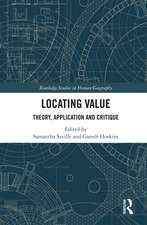Globalization, Technological Change, and Public Education: Social Theory, Education, and Cultural Change
Autor Torin Monahanen Limba Engleză Hardback – 18 aug 2005
| Toate formatele și edițiile | Preț | Express |
|---|---|---|
| Paperback (1) | 388.42 lei 6-8 săpt. | |
| Taylor & Francis – 18 aug 2005 | 388.42 lei 6-8 săpt. | |
| Hardback (1) | 1217.29 lei 6-8 săpt. | |
| Taylor & Francis – 18 aug 2005 | 1217.29 lei 6-8 săpt. |
Din seria Social Theory, Education, and Cultural Change
-
 Preț: 388.42 lei
Preț: 388.42 lei -
 Preț: 405.77 lei
Preț: 405.77 lei -
 Preț: 490.99 lei
Preț: 490.99 lei -
 Preț: 401.57 lei
Preț: 401.57 lei -
 Preț: 425.49 lei
Preț: 425.49 lei - 18%
 Preț: 1007.23 lei
Preț: 1007.23 lei
Preț: 1217.29 lei
Preț vechi: 1484.49 lei
-18% Nou
Puncte Express: 1826
Preț estimativ în valută:
232.92€ • 243.21$ • 192.34£
232.92€ • 243.21$ • 192.34£
Carte tipărită la comandă
Livrare economică 15-29 aprilie
Preluare comenzi: 021 569.72.76
Specificații
ISBN-13: 9780415951029
ISBN-10: 041595102X
Pagini: 228
Ilustrații: 6 b/w images
Dimensiuni: 152 x 229 x 23 mm
Greutate: 0.43 kg
Ediția:1
Editura: Taylor & Francis
Colecția Routledge
Seria Social Theory, Education, and Cultural Change
Locul publicării:Oxford, United Kingdom
ISBN-10: 041595102X
Pagini: 228
Ilustrații: 6 b/w images
Dimensiuni: 152 x 229 x 23 mm
Greutate: 0.43 kg
Ediția:1
Editura: Taylor & Francis
Colecția Routledge
Seria Social Theory, Education, and Cultural Change
Locul publicării:Oxford, United Kingdom
Notă biografică
Torin Monahan is Assistant Professor in the Department of Justice and Social Inquiry at Arizona State University
Cuprins
Acknowledgments Introduction 1. Politics of Space 2. Just Another Tool? 3. Technological Cultures 4. Fragmented Centralization 5. Policy Games 6. Flexible Governance 7. Future Imaginaries 8. Neoliberal Orders Appendix: Acronyms and Abbreviations Endnotes References





























